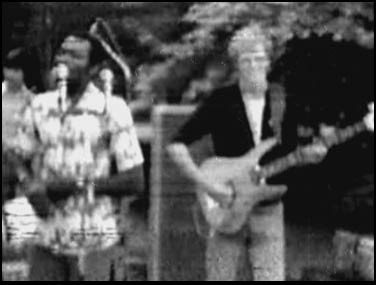 Hellmut
and the basses
Hellmut
and the basses
Hellmut Hattler has since he began as a bassplayer 40 years ago owned and
played many basses from different brands. We will walk through some
of the many models, and discuss why Hellmut liked them, and why he
went on to the next model. So this page is mainly about technical issues.Michael Bohn:
Has it been a long search for the ‘perfect bass’, or have you just changed taste along the way?
Hellmut Hattler :
Good question. During the search of the perfect sound you get used to specific sounds of the tools you use. If it creates new ideas: you are on the right lane. While you perform (and even compose) with that sound you get a signature style and people recognize you. If you want to change your style again, looking for something new, you have to try to throw all your habits away - it’s a bit like buying new pants…
Michael Bohn:
Why did you change the Tele to a Rickenbacker ?
Hellmut Hattler :
The Rickenbacker’s neck was much thinner. This factor, combined with its typical sound allowed me to play more solistically - and as i’m coming from guitar originally, this instrument felt like an almost logical consequence to me.
Michael Bohn:
What happened to the Tele since you shifted to Rickenbacker?
Hellmut Hattler :
I gave it to Karthago's bass player (you know I never kept my worn out instruments . . .) .
Michael Bohn:
No matter what bass you play, after the album Andy Nogger, the sound is unmistakably you, not only because of your technique, but it sounds like you have an exact idea of how your bass should sound. When did that first appear, and how has it changed through the years?
Was it the shift from Fender Tele to Rickenbacker that developed your style and technique?
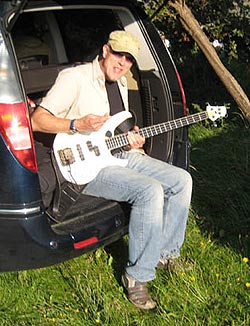 Hellmut
Hattler :
Hellmut
Hattler :“My” sound (originally was created with a Fender Telecaster bass, roundwound strings and plec technique) can be heard on the first two KRAAN albums - Conny Plank (producer/technician) exposed it to the place where it was supposed to be in the band mix.
Michael Bohn:
When you changed from the Rickenbacker to Ibanez, you got a softer / more round sound, was that the main idea, or was it the feel of a different bass (the neck, the shape etc) that made you shift?
Hellmut Hattler :
It were more the circumstances than a real plan of mine. In the time when my Rickenbacker’s neck went totally out of shape I met a guy in a music store, who introduced me to Ibanez basses. I was extremely sceptical as Japan wasn’t known for building very original sounding instrumentsat the time - but after visiting the German distributor for Ibanez I had to change my mind.
The model I fell in love with was the cheapest intrument in the entire Ibanez repertoire. Anyhow it lead to an endorsement contract which lasted quite a couple of years. But to answer your question: Music styles and fashions always change with the technical development of the music industry. When the synthesizer came on the market, the sound of the whole generation changed, the same with electrified instruments and computer based music nowadays.
Michael Bohn:
Since you like profound bottom and distinct top, why never a Fender Precison bass ?
Hellmut Hattler :
I was very close to buy one - but my legendary Fender Telecaster was the hallmark… the Ibanez “Blazer” (the cheap one) sounded quite a bit like a mixture between the Telecaster and a Precision bass, which I liked a lot.
Michael Bohn:
A tremolo/vibrato on a bass ?
Hellmut Hattler :
I think it was the partner of Jol Danzig ( from HAMER) who introduced me at the Frankfurt music fair to the Kahler people. They gave me one or two units that where mounted onto my Ibanez basses....
Michael Bohn:
So you never said "this Holdworth-dude sounds great, I will do the same on my bass" (or similar) ?
Hellmut Hattler :
Oh no, I fear I don’t have the fan gene...!
Michael Bohn:
Doesn’t it diminish the sustain a bit ?
Hellmut Hattler :
Oh, really? I never had the impression, anyway: I love to use the tremolo system in combination with flageolletts and a chorus effect.
Michael Bohn:
Today you are using a Status bass. Can you imagine someday that you will go from a Status bass to something else?
Hellmut Hattler :
yes, of course – I’m always open for new horizons, but as long as nothing new just jumps into my face, I’m happy with the basses I own.
Michael Bohn:
You seem to have removed the tonecontrol & volumecontrols on your statusbass ? - is this improving the sound a lot?
Hellmut Hattler :
The Alembic (replacement) pickups I have used for ages with all bass models and brands, do have, besides the volume - a bass - and a treble control potentiometer. I only removed all three knobs to have more space for my right hand playing.
Michael Bohn:
I know you have briefly used an Ibanez 8 string bass, I guess it was stringed as octaves?
Hellmut Hattler :
Exactly (btw: i had one from Warwick, too). I used the 8-string the most,
if i remember it right on "banana moon", "famous people",
"seven days", (and surely some more)...
Why wouldn't it be just wonderful to play a 5-string bass, I mean faster to reach higher notes, and the possibilty to go even deeper - (I' am sure your 'Glock- amp' would have no problems going deeper) ?
Hellmut Hattler
:
To go higher AND lower I’d better have a six string bass (okokok...)
anyway, the glockenklang would be the smallest problem – it’s
me, as I’m simply too lazy to re-program my brain, but... maybe
someday I’ll buy me a five string bass – if it comes along,
jumps into my hands and makes me feel happy...
Michael Bohn:
Effects: Delay, chorus, distortion, compression, delays, etc. What
are your favorites?
Hellmut Hattler :
I hate bass compression on stage! I only use wide and narrow chorus effects
(old digitech units) and sometimes different tap delays (for rare opportunities
like KRAAN’s “wintruper echo” or HATTLER’s “intro
mine”) - they are both part of my personal sound.
Michael Bohn:
You have used different amps during the time I can remember
Orange, Peavey, Glockenklang ? What do you prefer Tube or transistor?
Hellmut Hattler :
The Orange Matamp (tubes) was great in combination with the Rickenbacker,
but the Peavey (transistors) was ok, too… the Glockenklang
I use now: preamps have both tube & transistor – and sound just
excellent!
I had two big speaker cabinets on stage, one (2x 15”, 4x12”)
was driven by the orange, the other one (6x12”) was driven by the
Peavey (I guess I bought this amp from Alto Pappert). The first time I
had to use it was when the orange broke down before (or during?) a concert
and I was surprised about the bass sound!
Not to forget:. In the 80'ies I played CRAAFT amps and speakers –
I even helped to create the “Hellmut Hattler signature combo”
(maybe the first amp with speaker simulations). it still works! (CRAAFT
was the professional product line of “Solton”, a builder and
distributor of midprice sound systems from Pocking / Bavaria)
Michael Bohn:
Why not 18" speakers, and why never the classical huge Ampeg
that many other bassplayers seems to love?
Hellmut Hattler :
It just doesn't match with the sounds I'm producing on my bass...
Michael Bohn:
How much of the sound is in the fingers and the playingtechnique?
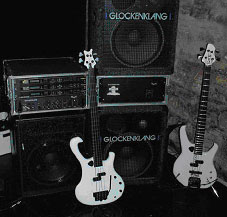 Hellmut
Hattler :
Hellmut
Hattler :
All the different playing sounds I produce are done with the right hand
using finger tips or a plec (important too: the plec position, down or
upstrokes and the dead notes make the percussive sounds) I never change
the sound by switching the pickups (as I only have one!) or other sound
units/devices (except the chorus FX of course).
The tools I use on stage:
1. My main basses (white and blue) are hybrids: bodies by Status, pickups
by Alembic, tremolo bridges by Kahler
2. Custom HH signature bass built by ”Ritter bass guitars”,
Germany
Strings: elixir (0.45, 0.65, 0.85, 1.05)
Plec: Heriba custom
Cables: Sommercable
Pre amp / power amp, cabinets: Glockenklang Bugatti
chorus/delay unit: Digitech IPS33B
Michael Bohn:
How often do you do maintenance on your bassgear?
Hellmut Hattler :
Only when something sounds or smells funny. ![]()
Michael Bohn:
You are a selftaught musician. Rather hypothetical, but: Would your
sound & playingstyle have been different if you had any formal "bass-education"
or formal musical training? - probably impossible to answer...?
Hellmut Hattler :
But easy to answer. Look at all the guys who studied at Berklee/Boston.
They all sounded the same when they came back home - and had the same
goal: To be able to play all known scales over all harmonies. To KNOW
music means not that you know how to express yourself musically.
Michael Bohn:
In many bands the bass is mostly a backing instrument, but you have allways
been just as much in front as the guitar, did this come from your playing-style,
the compositions, or does Peter Wolbrandt's [the guitarist in Kraan] playing-style
have something to do with this?
Hellmut Hattler :
Alpha animals always find a spot to impress ![]()
Michael Bohn:
Before Kraan just a few bassplayers in rockmusic made bass-solos (I
can remember John Entwhistle, Jack Bruce, Jack Cassady, Tony Reeves, Felix
Papparlardi) but you were a pioneer on bass-solos without any backing
at all, and it became a good tradition to Kraan concerts, were you allways
involved the audience in it. How did that come up?
Hellmut Hattler :
Sometimes I had the intention to lead the lorry out of the mud (f.e. when
the others were too stoned on stage, or just were lost in arrangements)
so I escaped - in bass solos...
(example: http://www.youtube.com/watch?v=7cpMKsjs_xI)
Michael Bohn:
I remember reading that Kraan in the beginning was inspired by free
jazz. One can't say that your bassplaying has any references to that genre
anymore. Was your bassplaying ever inspired by any other bassplayers?
Hellmut Hattler :
There was a strong influence by free jazz on all of us; but when we started
KRAAN, we already were back to harmonies and groove. Only sometimes when
we improvised we slid into glides and atonal parts but at last tried real
hard to reconcile head and ass, intellect and lust, east and west by combining
and mixing up all we had up in the sleeve so far... But of course, there
have been bassguitarists who had something to say before that period -
like... hmm... John Entwhistle of “The Who” (who impressed
me deeply on "My Generation") or even Andy Frazer of "Free",
too. Both where real band players with the ability to break out of the
loop.
Michael Bohn:
There are not that many virtuoso bassplayers using plectrum out there,
but other notable plectrum-players/virtuosos that comes to my mind are
Steve
Swallow (jazz), Anthony
Jackson (jazz), John
Entwhistle (The Who), Chris
Squire (YES), Ray
Shulman (Gentle
Giant), Andy West (Dixie
Dreggs).
Have you ever felt that the technique determines the way you think/make
music, or is it 'just' a technical issue, like: You play whats in your
head with your technique?
Hellmut Hattler :
It's just the easiest way for me to express my feelings - no credo at
all.
Michael Bohn:
How do you feel about 'instrumental virtuosity' - Is it a trend that
comes and goes? - I remember the 80'ties when guitarsolos all of a sudden
became unfashionable (perhaps because they got too long in the 70'ties).
Hellmut Hattler :
As I have never looked too much at trends - I didn't even know that it's
out of fashion.
Michael Bohn:
Do you feel related to other bassplayers today?
Hellmut Hattler :
Not really, I know many of them but, hmm, it's a difficult relationship,
as some admire and some might even hate me...
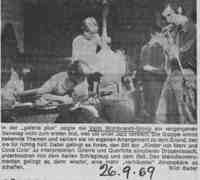
Upright bass
Bought this instrument for little money from a retired teacher. Was proud as hell, as it promised to get me more into jazz… it sounded quite good but was incredibly hard to play, my fingers suffered so I also played it not just with a bow but hit the strings with a rubber tipped drumstick. Someone broke the bass years later on at one of the famous Wintrup Christmas parties…
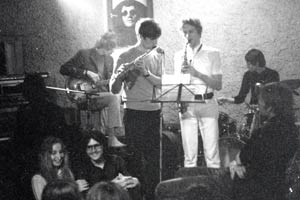
Höfner semiacoustic
(<- Click for large photo, HH is still finger picking)
My very first bass guitar. I spend all my money for it being 15 years old. I wanted to form a band, but the guy who was supposed to play bass had no instrument (I was the guitarist
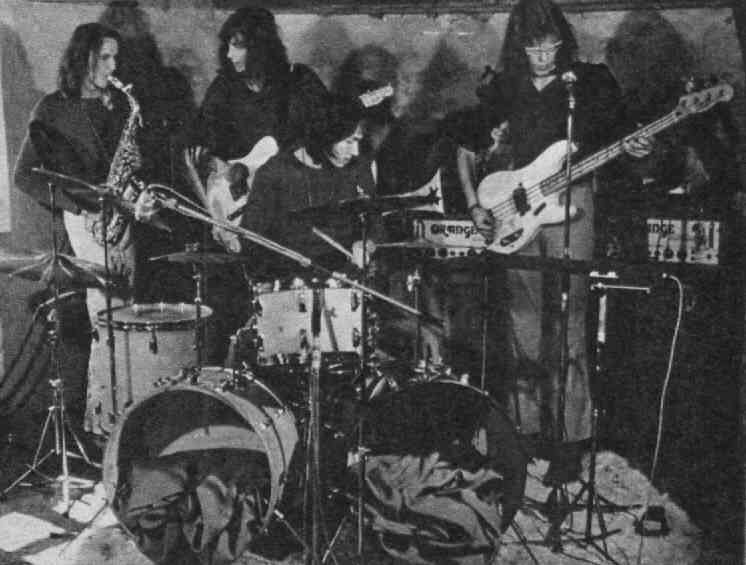
Fender Telecaster bass
I’m sure this instrument is the reason for my unusual playing technique. The sound of the single coil pick up and the wide and empty “playing field” tempted me to play with a guitar plec again. It sounded great with the Rotosound roundwound strings.
I gave it to Karthago's bass player Gerald Hartwig (you know I never kept my worn out instruments . . .) .
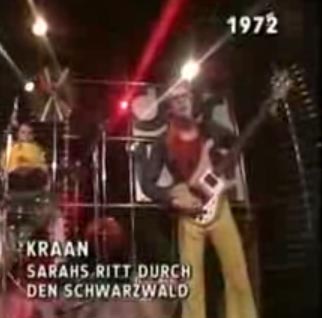
Modified Rickenbacker 4001 wood/beige + Gibson EB0 pickup
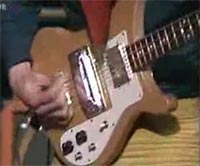
A friend sold it to me after intensive sound experiments by building in replacement pick ups.
I guess he chopped out too much wood, as the bass smashed into pieces after a warmup gig in Berlin – just one day before Conny Plank was recording the legendary “KRAAN live” album…
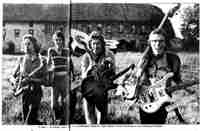
Rickenbacker 4001 wood/beige + some upright bass (over the shoulder)
The upright bass was built by the German company “Framus”. an attempt to sound jazzy in a amplified band (which didn’t really work)…
- and in the picture we see is the last days of the modified Rickenbacker (R.I.P.)
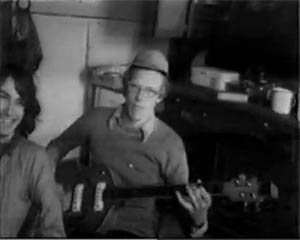
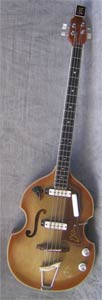
Belonged to Jan Fride.
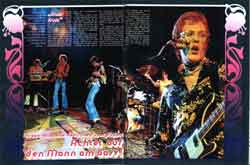
Rickenbacker 4003 black
That’s the instrument I had to buy in Berlin the very day of the “KRAAN live” recordings! It wasn’t even perfectly adjusted when I went on stage… those were the days…
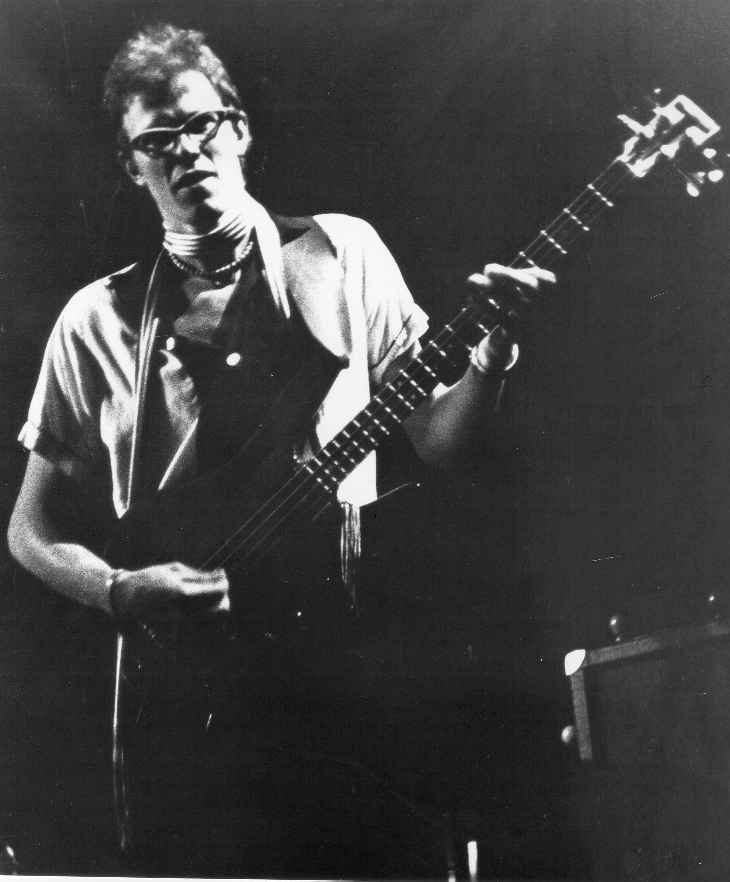
Copenhagen 1976
Travis Bean TB2000
I didn’t use it much, it gave me cold fingers, the neck is made of aluminium. I played it on the “Lilienthal” album (1978) though.
http://www.travisbeanguitars.com
Travis Bean TB2000 was first produced in 1975
HH plays TB2000 at Graf Metternichs birthday.
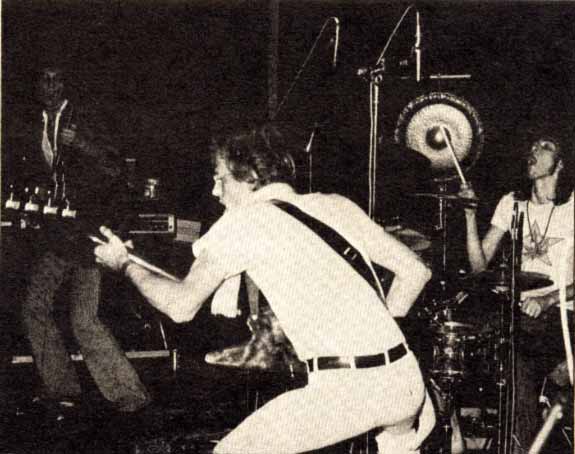
Hamer explorer
Hellmut says:
It was a gift from Hamer, it was a bit too heavy.
Wiederhören constitst of two recording
sessions, I guess I played the Hamer on the one with Conny Plank (= Vollgas
Ahoi, Silky Way, Yaqui Yagua, Wiederhören) . In the same session
we recorded “Sunday walk”, which dropped onto my “Bassball”
album, so this should be the Hamer on this track, too.
I don’t remember what other instruments i used (as apart from the
red Rickenbacker there weren’t to many others)...
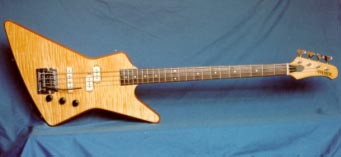
Not Hellmuts Hamer, same model though.
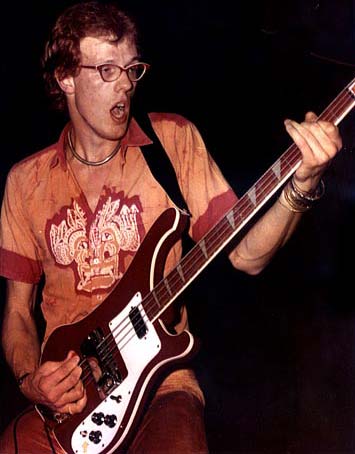
Rickenbacker 4003 Red
My favorite Rickenbacker. It sounded so much better than the black one, but was mechanically shit.
This is the bass that Hellmut 'customized' into the one you see below (MB's comment).
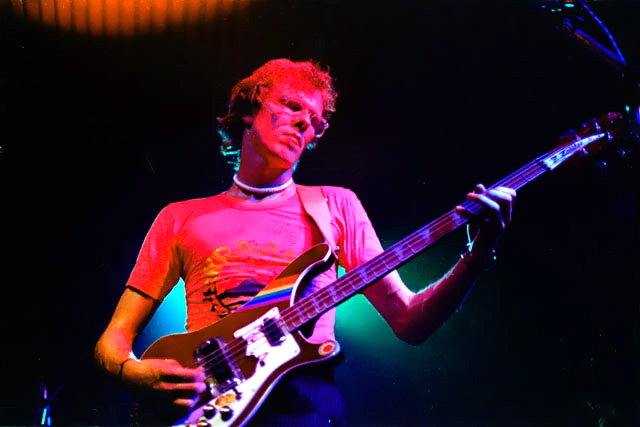
Rickenbacker "Hellmut Hattler signature"
It wasn’t a signature model. I “customized” it myself . I only replaced the bridge (built by the Hannover based co. “Rockinger” who made a bass for me once, too), cut the face out, sticked the rainbow tape on and replaced the name tab, wrote my name on the headstock...
I never had the idea to ask Rickenbacker for an endorsement deal.
I donated this to the Meinl/Ibanez museum, Neustadt/Aisch.

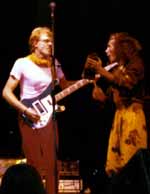
Rickenbacker 4003 Black
I bought many Rickenbackers, and I think they sold many bass guitars because I used them and made them popular in Germany. But they never offered me any instruments, and as they have not been very stable or well built, one day my red one passed away, too…
So I was very happy when Ibanez offered me a well paid endorsement deal that lasted for many years and helped to have the time and the money to do lots of musical experiments during the 80'ies.

Ibanez Roadstar - red
Ibanez released many basses, modifying the repertoire every now and then, so I had a hard time to get everything tested. I used the less expensive istruments, such as “blazers” and several “roadsters”.
Michael Bohn:
I just listened to the tune 'Playing for you' from Nachtfart 1982, and I often noticed that on this particular tune, your bass sound is more rough than on the other tunes. It sounds great, but more heavy than Kraan use to. Why is that?
Hellmut Hattler :
Recordingwise this song should have the same bass sound as on "Wintruper echo". Both tracks were recorded at the old "ege studio" in Bad Schussenried (nearby). His old tools and mixing console sounded veeeeery special, (Gerry Brown refused to record there after a long sound check...). "Wintruper echo" was mixed later in Berlin (Budde studio), I guess the"playing for you" mix was done at ege's (don't remember exactly). Anyway, I liked this roaring bass sound as it fitted perfectly to the song's atmosphere.
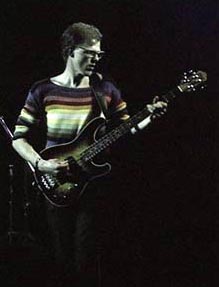
1979/84
Ibanez Roadstar – sunburst - the same model as above but
different color.
During my Ibanez era I exclusivly played their instruments. Also fretless- four-, five- or eight string basses.
(Some fretless bass is heard on Soul of stone (possibly also on other albums) - MB)
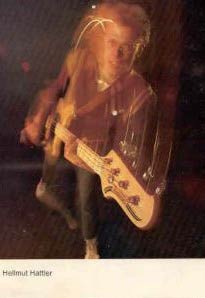
Ibanez Blazer
A cheap model, that felt good, and sounded good. Ibanez wanted me to play more expensive Ibanez basses, but accepted that this was my favorite. It basically had a sound like a Fender precision.

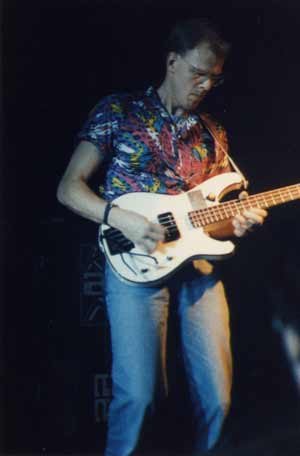
30.10.1987 Gütersloh Alte Weberei
IBANEZ Roadstar white
Oh, this one sounded great. It’s maybe a fault to give an instrument away, when a new one appears, as I still miss this one! Its the one I used on 'dancing in the shade' , but i remember having dubbed one of Peters compositions during the recording sessions with my (then) brandnew white warwick.
Here you can see it in action: http://www.youtube.com/watch?v=uljBW62cTK8
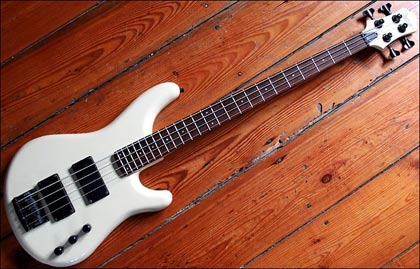
A slightly different and later Roadstarmodel - rounded bodysides,
different pickups, no tremolo.
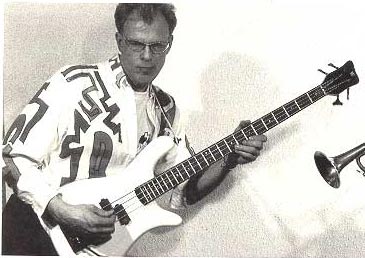
Warwick streamer
The German Ibanez distributor kicked me out of the endorsement contract after I asked them to build in Warwick pickups in my upcoming signature model.
Warwick felt guilty and made me a Warwick endorsee

My warwick (i just wrote a “T” before and an “O” behind the “W”arwick brand sign)
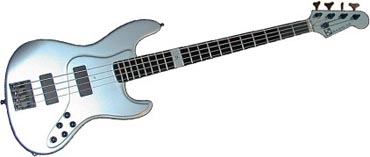
BassLab Soul-IV
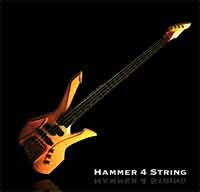
Auerswald Hammer 4
Webmaster: In the nineties Hellmut borrowed and
tested many basses, some of them made from composite materials (e.g. not
wood).
These are usually rather expensive creatures.
Basslab lent him
a BassLab Soul-IV (dont know if it was used for any recordings).
Auerswald
lent Hellmut a dark green Hammer 4 that you also can see on this 1994
Tab Two video (song: This beat goes boom boom): http://www.youtube.com/watch?v=bCYmnHbEXIE
(might not be possible to see it in Germany, legal rights issue).
Really bad screenshot of the bass from the video here
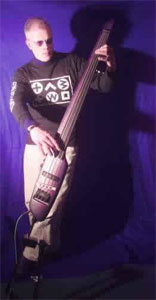
1995
BASSLINE Universal 4 Upright
This is how my 1990ies fretless sound looks like! I played the “Universal 4” upright bass on several TAB TWO records.
http://www.bassline-bass.de/endorser.php
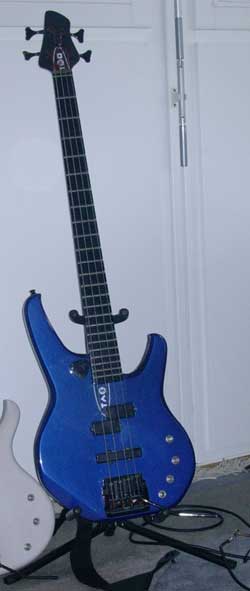
1995
STATUS Eclipse Artist
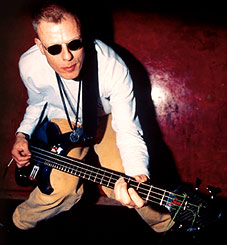
Official Status site:
http://www.status-graphite.com
Status Community:
http://www.statii.com
Notice the reversed P-bass pickup setup for better treble reponse.
(Eventually look at the Ibanez Blazer on this page to see the typical
positioning of a P-bass pickup)
This was / is my main instrument, especially when I travel. Very reliable. I have two, a blue and a white.

091105 HATTLER in Ulm, Roxy.
Photo by Timmi Steinel.

ta daaa!
Ritter Bass - Custom Made
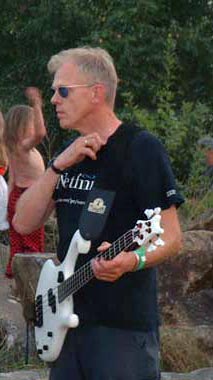
This bass guitar is a real custom made instrument developed and manufactured by Jens Ritter himself. He “merged” the Status- the Rickenbacker- and the typical Ritterbass bodies into one single shape! A great Instrument built by a real genius!
More photos of this bass:
http://www.ritter-basses.com
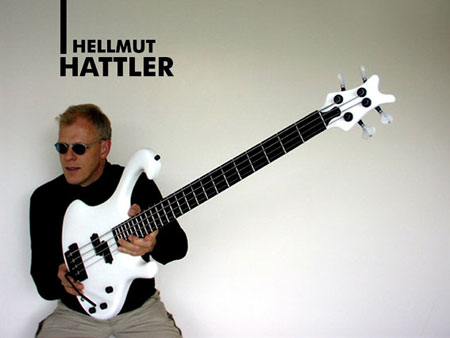
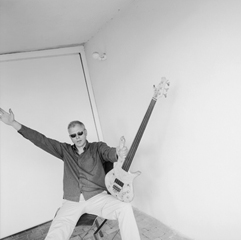
2000
MAGNUS Krempel -
Sharkey IV fretless
The Sharkey is an incredibly organic sounding instrument. All of the fretless tracks on the HATTLER albums are done with it. I feel just not good enough to play it onstage.
http://www.magnusguitars.de/baesse.htm
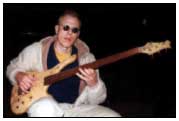
Links to some of the mentioned manufacturers:
Glockenklang
Status
bass
Ritter Bass
Alembic
(Pickups)
Elixir strings
Sommercable
Digitech effects
Warwick
bass
Magnus
guitars
Ibanez
Rickenbacker
Travis
Bean
Hamer
CRAAFT
Kahler
www.vogel-guitars.com
www.rockinger.com/
Todays gear (2009):
STATUS Eclipse Artist – custom made - Alembic
P-PU, Kahler Tremolo
RITTER Classic – custom made – backup) Alembic
P-PU, Ritter RB-1 Tremolo
MAGNUS Sharkey IV (studio) fretless, Piezo-PUs
DIGITECH GSP-21 + midi-floorboard
DIGITECH IPS-33B harmonizer, tuner
DIGITECH DSP-256XL chorus, delay
IBANEZ DD200 2nd delay + loopmachine
GLOCKENKLANG Bugatti stereo preamp Class-A technique
GLOCKENKLANG Bugatti stereo amp 2 x 400 WattGLOCKENKLANG
Bass Art Mk II 15” + 2” horn (3x), 500 Watt
Thanks to Hellmut Hattler & Fred Bauer.
(Published December 2009 / Michael Bohn )
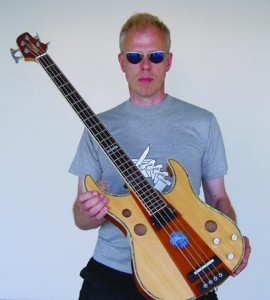
Vogel
Balance Bass ca. 2003
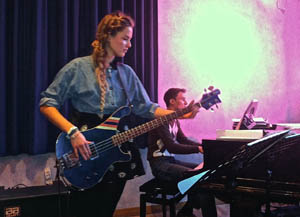
Click for a larger version
2015 - Hellmut is happy about his new Warwick gear.
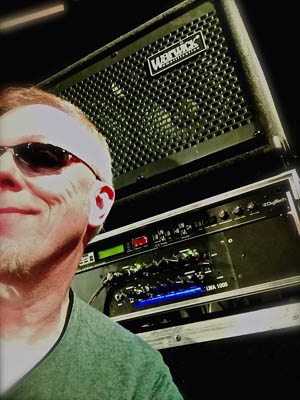
Click for a larger version
02.03. 2015 - Hellmut with is brand new Warwick bass:
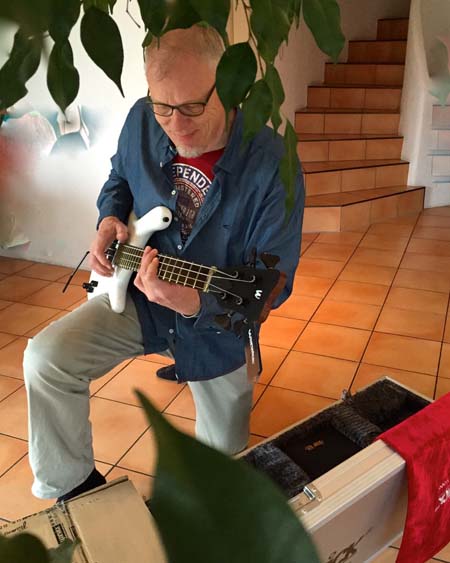
https://www.facebook.com/warwickframus
Hellmut: "my new warwick custom made bass (with a tankwood neck)
arrived today - same shape as my old Streamer, but the wood of the neck,
the frets, the pick ups, the electronics, the machine heads - almost eveything
is different except the body shape."
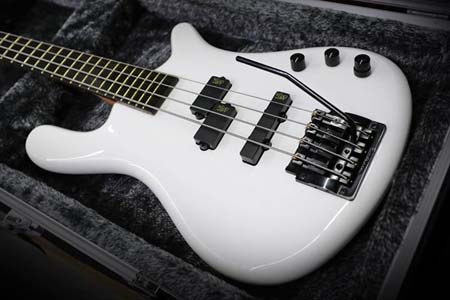
Gear-Chat und Interview mit Hellmut Hattler:
https://www.bonedo.de/artikel/einzelansicht/gear-chat-und-interview-mit-hellmut-hattler.html
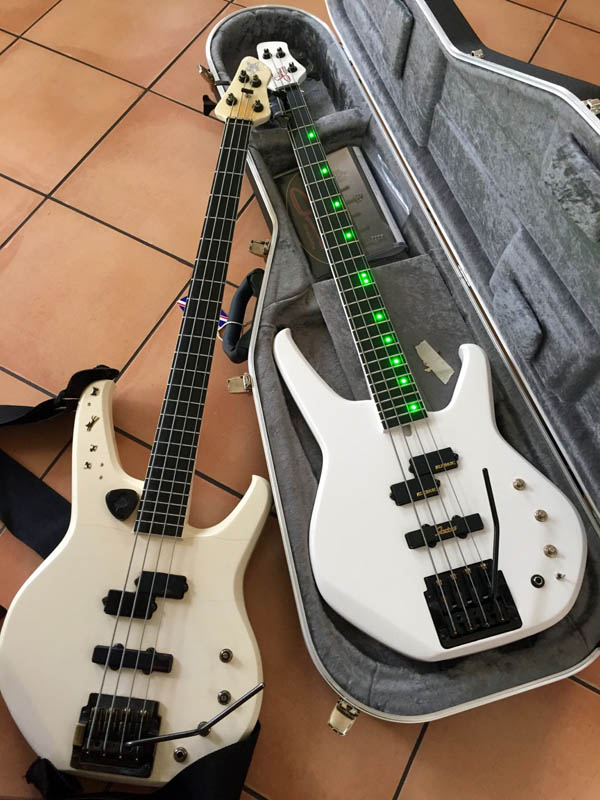
Hellmut says:
After more than 1300 concerts and after 25 years of constant operation, my white Status Bass has got a green eyed sister!
Mr. Rob Green (Status CEO) built me a great follow-up instrument (that might easily become the touring stimulus for the next 25 years).
---------------------------------------------------------------------
25.2.2021 update from the Kraan Facebook:
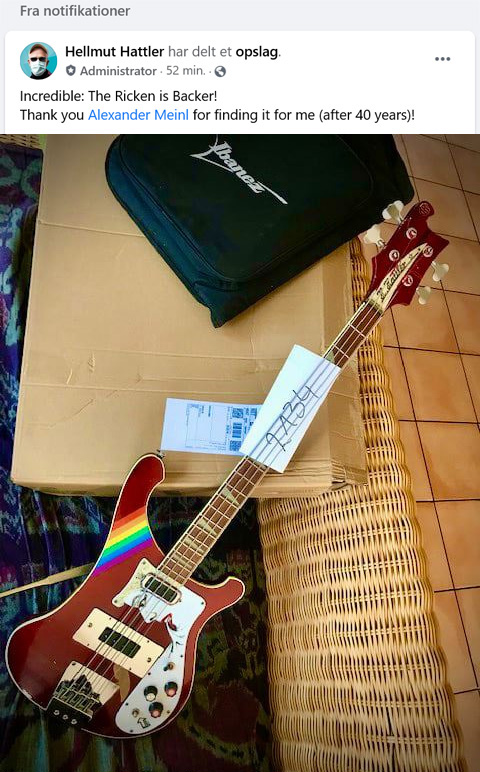
Nach 40 Jahren: Verschollener KRAAN-Rickenbacker kehrt zu Hellmut Hattler zurück!
Hellmut Hattlers roter Rickenbacker-Bass ist ein Stück deutsche Musikgeschichte
https://www.bonedo.de/artikel/einzelansicht/nach-40-jahren-verschollener-kraan-rickenbacker-kehrt-zu-hellmut-hattler-zurueck.html
